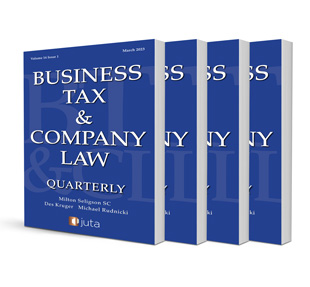
The Companies Second Amendment Act 17 of 2024: Ameliorating the Timebarring Regime under Sections 77 and 162 of the Companies Act
Author: Milton Seligson SC and Matthew Blumberg SC
ISSN: 2219-1585
Affiliations: Honorary Member, Cape Bar; Member, Cape Bar
Source: Business Tax & Company Law Quarterly, Volume 15 Issue 3, 2024, p. 9 – 22
Abstract
A director owes duties to the company of which he or she is director. These include, in the main, a fiduciary duty and a duty to exercise reasonable care, skill and diligence. This is the position at common law, as well as under the Companies Act. Sections 77 and 162 of the Companies Act contain the two principal remedies for breach of these duties. Section 77 provides for the director concerned to be liable for loss sustained by the company as a consequence of the breach. Section 162 provides for the director to be declared delinquent or under probation. Both sections have time-barring provisions. In terms of the existing section 77(7), proceedings by the company concerned to recover loss from the director may not be commenced more than three years after the act or omission that gave rise to the liability — i e irrespective of when the company did, or could have, acquired knowledge of the act or omission in question. In terms of the existing section 162(2)(a), stakeholders in a particular company wishing to bring delinquency proceedings against an individual who was, but no longer is, a director of the company, are required to do so within 24 months of the date on which the individual ceased to be a director — i e, even if the stakeholder concerned did not have knowledge of the delinquent conduct, and could not reasonably have acquired it, within the stipulated 24-month period. These time-barring provisions have the potential to operate harshly — and so it has been contended, unconstitutionally. In light thereof, and following recommendations by the Zondo Commission, the time-periods have been revisited, and substantially ameliorated, in the recently enacted Companies Second Amendment Act. As part of these amendments, a discretion is now conferred on the court, in the context of both remedies, to extend the relevant time-period on good cause shown. The article analyses the existing time-barring regime (i e, that are currently in place and which will remain in place until the Companies Second Amendment Act comes into operation); identifies the deficiencies in that regime and the likely rationale for amendment thereof; and explores the pros and cons of the more flexible time-barring regime introduced by the Companies Second Amendment Act.